The Disappearance Blu-ray Movie
HomeThe Disappearance Blu-ray Movie 
Limited Edition to 3000 - SOLD OUTTwilight Time | 1977 | 91 min | Not rated | Aug 13, 2013
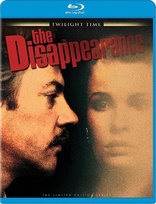
Movie rating
6.9 | / 10 |
Blu-ray rating
| Users | 3.5 | |
| Reviewer | 3.5 | |
| Overall | 3.5 |
Overview
The Disappearance (1977)
The Disappearance is a 1977 British-Canadian thriller film directed by Stuart Cooper and starring Donald Sutherland, Francine Racette and David Hemmings. It is based on the novel Echoes of Celandine by Derek Marlowe.
Starring: Donald Sutherland, Francine Racette, David Hemmings, John Hurt, David WarnerDirector: Stuart Cooper
| Thriller | Uncertain |
| Drama | Uncertain |
Specifications
Video
Video codec: MPEG-4 AVC
Video resolution: 1080p
Aspect ratio: 1.85:1
Original aspect ratio: 1.85:1
Audio
English: DTS-HD Master Audio Mono
Music: DTS-HD Master Audio 2.0
Subtitles
None
Discs
50GB Blu-ray Disc
Single disc (1 BD)
Playback
Region A (locked)
Review
Rating summary
| Movie | 3.0 | |
| Video | 3.5 | |
| Audio | 4.0 | |
| Extras | 4.0 | |
| Overall | 3.5 |
The Disappearance Blu-ray Movie Review
Going, going, waaay gone.
Reviewed by Jeffrey Kauffman August 14, 2013The term film maudit is not as well known as its French sibling film noir, but a cursory glance at some search engine results can provide a few clues. The term was coined in 1949 by a group headed by Jean Cocteau at a festival devoted to this “new” genre, namely the “cursed film” (maudit is variably meaningful in French as either “cursed” or “damned” as the recent Blu-ray release of René Clément’s The Damned, known in France as Les Maudits, shows). In the Cocteau group’s formulation, this didn’t necessarily refer to the production of the film (think of tragic shoots like Twilight Zone: The Movie or The Crow), but more to the reaction— usually negligible—films got, which according to Cocteau’s coterie was often undeserved. Falling into the category almost by default were a number of outings which Cocteau and others chose because they were intentionally provocative, something that no doubt “aided” their rejection by mainstream audiences. The term film maudit has repeatedy been applied to a number of independent or quasi-independent features from the late sixties on, films which defy convention and (if we’re being completely honest) logic—at least some of the time. And so we come to The Disappearance, a film which lived up to its title and vanished rather quickly after an extremely brief theatrical exhibition (evidently only one day in New York City), only to gain at least a somewhat rehabilitated reputation through the intervening years and the tantalizing appearance of the always enticing “director’s cut”, which was never commercially released (it’s included in standard definition on this Blu-ray). The film is described as both a film maudit and (just for good measure) a film gris in the textual material accompanying this release, and whether or not one has a firm grasp on these continental terms, they at least indicate that The Disappearance is a distinctly European experience, one that takes an Art House sensibility and attempts to siphon it through a somewhat constrictive vise of flashback and more traditional thriller elements. In any of the three versions presented here (along with the mysterious 91 minute cut presented here in high definition and the aforementioned director’s cut which runs 101 minutes, there is an approximately 15 minute snippet from the retooled distributor’s cut, the one which evidently had the very brief theatrical run in 1977), The Disappearance may in fact not be a successful or even a completely satisfying film experience, but it’s never less than fascinating, especially for cineastes who dwell on the importance of editing and comparative analyses of different versions of the “same” film.
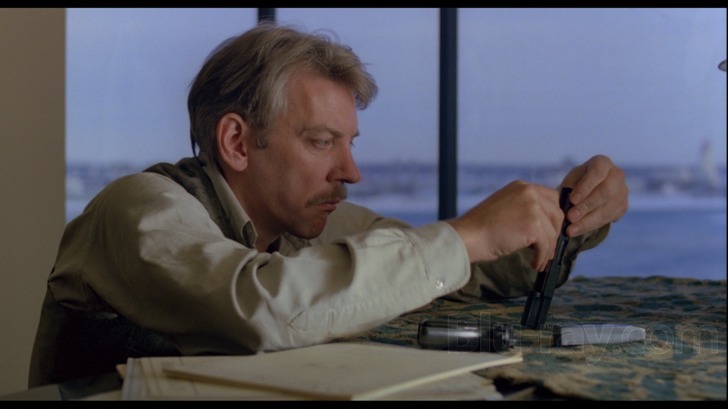
One of the odd things about categorizing The Disappearance as film maudit is that if this film is provocative —and some will certainly believe it is—it’s provocative in an almost passive aggressive sense. This is a film which, in the two “complete” versions included on this Blu-ray, doesn’t just skew traditional storytelling methods by ping ponging almost willy nilly from flashback to a “current” time frame, it features some unbelievably tamped down, one might almost say zombiefied, performances. The film therefore plays out rather like something culled from a dream state. Images waft by, seemingly unrelated, while actors intone various lines without seeming to have much if any emotional connection to them (save for a few exceptions), and the result is an often bizarrely dissociative experience.
Though they’re manifestly different in style, tone and content, two masterpieces by Alain Resnais, Last Year at Marienbad and Hiroshima, Mon Amour (sadly far past due for a domestic Blu-ray release), kept springing to mind as I watched The Disappearance. All three films tell somewhat disjointed, non-linear stories, and all three are wrapped up in the world of memory and the vagaries of love. The Disappearance is in fact probably the least opaque of the three, at least when considered from a distance, something that might be surprising to those who have read reviews of the Stuart Cooper film claiming it was incomprehensible.
Donald Sutherland plays Jay Mallory, a high powered hit man who works for an assassination bureau known as The Office. Mallory is married to Celandine (Francine Racette, Sutherland’s real life wife), a woman who as the film begins has disappeared (hence the title) but who it is slowly revealed in a series of convoluted flashbacks has been threatening to leave Mallory for some time. As Mallory wends his way through a series of memories dealing with his wife, he also is contacted to perform a new hit, an assignment that he instinctively feels is “off” somehow, but which he ultimately accepts somewhat grudgingly. That sets him off on a quest to find a man who, it turns out, has an unexpected connection to his missing wife.
That précis may seem rather straightforward, but under the sometimes overly arty (or Art House-y) direction of Cooper and the labyrinthine screenplay of Paul Mayersberg, The Disappearance is an intentionally disjointed exercise in free association and pretzel like self-reflection. (This aspect is again very Resnais-like; some cynics may in fact aver that the two Resnais films listed above are what put the “vague” in nouvelle vague.) Along the way Mallory comes into contact with co-workers (David Warner and John Hurt), former lovers of his wife (David Hemmings, who also co-produced), and, in a sumptuous little cameo, a charmingly lugubrious Christopher Plummer as the mark for the hit who has a few secrets of his own to impart. But the main thrust of the story is the simultaneously unfolding of Mallory’s memories about Celandine and his current assignment.
The film has the necessary gravitas a dramatic thriller like this requires, especially from the likes of Warner and Sutherland, but unfortunately Racette, probably still best remembered for her Dario Argento film, Four Flies on Grey Velvet (though she appeared in a number of other films, including Au Revoir Les Enfants), simply doesn’t have the dramatic chops to pull off the central role of Celandine. As Cooper divulges in the interview included on this Blu-ray, Sutherland initially demurred when offered the film, but put forth Racette as the “perfect” Celandine. One might question his motives given his romantic involvement with the actress, but the result is sadly the same—Racette stumbles through many of her scenes, often mangling even the simplest English lines, and never really making much of an impression as either a putative femme fatale or even, perhaps more devastatingly, a wife grown weary of her husband.
Cooper also adds to the problems by introducing too many overly “artistic” elements, including at least a couple of gratuitous sex scenes which do nothing to propel the plot and which (even worse in my opinion) aren’t even very erotic. The film actually does much better in its down to earth, hard bitten assessment of the life of a professional assassin. The scenes between Sutherland and Warner, and, later Sutherland and Plummer, crackle with an energy that some of the rest of the film never quite attains. There’s the all to frequent disparagement of various films as offering style over substance, but in the case of The Disappearance, there actually is substance, quite a bit of it in fact. Unfortunately Cooper’s style sometimes gets in the way of being able to see it.
The Disappearance Blu-ray Movie, Video Quality 
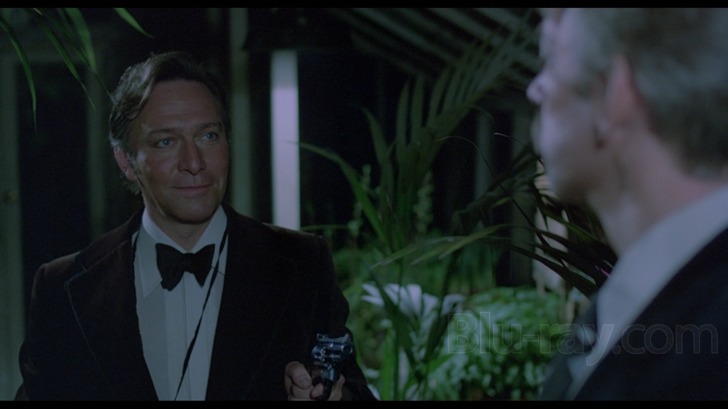
The Disappearance is presented on Blu-ray courtesy of Twilight Time with an AVC encoded 1080p transfer in 1.85:1. This certainly has to be at or near the top of videophiles' lists of films we never expected to see on Blu-ray, and the good news is the elements are in remarkably good condition, with very little damage to report. That said, this high definition presentation is pretty soft looking almost all of the time, with color that, if not actually faded, never really rises to substantially robust levels. The general softness tends to keep fine detail from ever really popping in any meaningful way, though there's certainly no evidence of any digital tweaking of any kind having been done to this release. I personally would have preferred contrast to have been just slightly boosted, as I think that might have helped with some delineation, especially in a couple of crucial dark sequences where it's very hard to make out what's happening. All of this said, this is certainly a solid if unspectacular looking presentation of a film few have probably ever seen or in fact ever hoped to see.
The Disappearance Blu-ray Movie, Audio Quality 
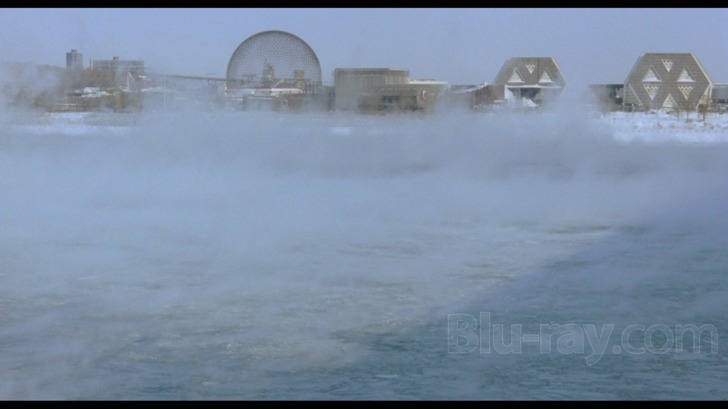
The Disappearance features a lossless DTS-HD Master Audio Mono mix that very capably supports the dialogue, nice score (including lots of piano music) and occasional bursts of sonic activity like gunfire. There's nothing overly ambitious about the sound design here, but certain scenes have great ambient environmental effects (the Canadian scenes take place in a blustery winter environment). Fidelity is excellent and dynamic range is rather wide, all things considered.
The Disappearance Blu-ray Movie, Special Features and Extras 
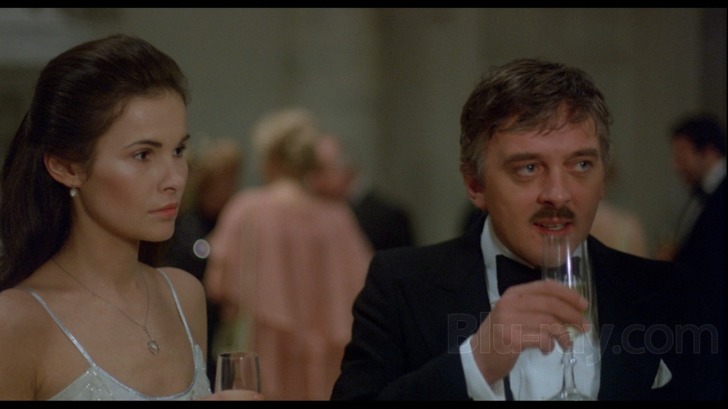
- The Disappearance - Original Director's Cut (480i; 1:41:35). This cut is a bit more developed than the 91 minute cut, and provides some additional background on Sutherland's character, but the most immediately compelling thing about it is simply the different way it tells the story. Merely comparing the opening of this version versus the two other versions on this Blu-ray is a fascinating study in how editing can affect storytelling. The video quality here is fairly variable, but it improves markedly for the most part after a dicey opening few minutes during the credits.
- An Interview with Stuart Cooper (1080p; 9:02) is a brief but really interesting sit down with Cooper, who talks about his school days, where he met people like John Hurt, and his early career, which included run-ins with the likes of George Harrison. He seems somewhat mystified by the 91 minute cut included on this Blu-ray, but approves of its general ambience, at least when compared to the botched distributor version.
- An excerpt from the re-edited and re-scored U.S. release version of The Disappearance (480i; 15:29). Cooper talks about how hideous this version is in his interview, but watching this opening section reveals a rather interesting reformulation of the story. Despite Cooper's dismissal of Craig Hundley's score for this version, it's at least atmospheric and suspenseful. This is yet more fascinating watching for those interested in how different cuts of the same material can create a manifestly different experience.
- Isolated Score Track is presented via DTS-HD Master Audio 2.0. The score is credited to Robert Farnon, one of the titans of British "easy listening" music (an unfair appellation given Farnon's really exquisite arranging skills), but a lot of the music here consists of dolorous piano pieces by Ravel, which perfectly suit this film's wintry mood.
The Disappearance Blu-ray Movie, Overall Score and Recommendation 
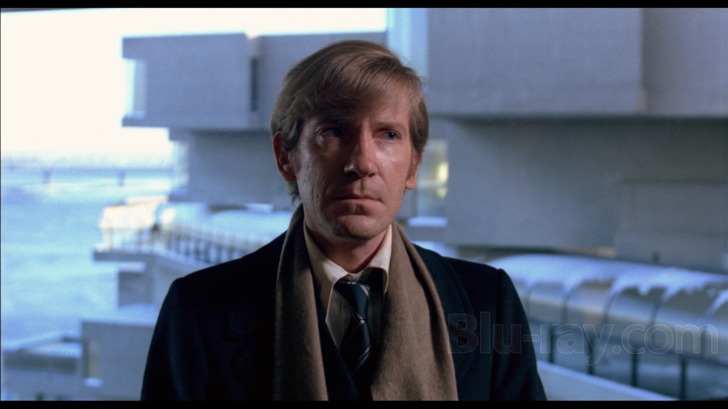
The Disappearance is the rare Blu-ray release that I strongly recommend even for those who may in fact end up hating the film. This overall package is so inherently fascinating it's really a "must buy" for those with any interest whatsoever in how editing can drastically affect the same footage. Watching the two "complete" versions of the film included here is like watching two completely different films at times, and the added bonus of the re-scored and re- edited theatrical release snippet is icing on the cake. I freely admit the film itself has issues; I personally feel it could have done with a lot less Art House and a lot more Le Carré (so to speak), but other than Racette the performances are excellent and the mood is suitably dour. This Blu-ray offers generally very good video and audio and comes (for reasons outlined above) Highly recommended.
Similar titles
Similar titles you might also like

In the Line of Fire
1993

The Edge
1997

The Destructors
The Marseille Contract
1974

The Odessa File
1974

Ice Station Zebra
1968

The Kill Team
2019

7 Days in Entebbe
2018

Eagles Over London
La Battaglia d'Inghilterra
1969

The Star Chamber
1983

The Square
2008

American Traitor: The Trial of Axis Sally
2021

Mosquito Squadron
1969

Aces High
1976

Behold a Pale Horse
Limited Edition to 3000
1964

36 Hours
Warner Archive Collection
1965

The Green Man
1956

Hart's War
2002

Pursuit
1972

Return from the Ashes
1965

Airport 4K
1970